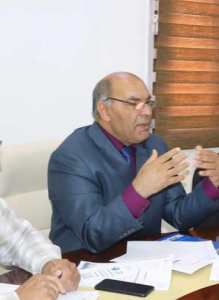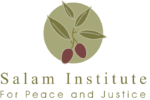
Voice of Peace; Almabrouk Al-Ghadhywi: The Network for Reconciliation and Forgiveness in the Arab World
The establishment of the Reconciliation and Forgiveness network in the Arab World in joint collaboration with Rased Jordan was a concluding outcome of the reconciliation and forgiveness conference held in Jordan from May 27th -29th, 2023 that brought together 35 practitioners of conflict resolution from diverse locations of the larger Arab region. The Arab region which has its diverse conflict-based challenges is also rich in its cultural tapestry and traditions of peacebuilding. Representing the 11 Arab region countries that participated in the conference and resulting in eight months of research, meetings, coordination, and general agreements, the much-awaited network was launched.
Almabrouk Al-Ghadhywi from Libya, a member, and Secretary General of the Libyan local Mediators Network, Chairman of the board of directors for the Maa’man organization for Peacebuilding, and Chairman of the Shura Council of the Municipality of Bani Walid.
Reputed as a rare neutral voice of objectivity in the volatile past of Libya, Almabrouk’s professional career has been in Libyan Airlines. Functioning as an accountant at Libyan Airlines, he gained much popularity for his honesty and integrity.
At the height of the social and political conflicts in Libya, Mr. AlMabrouk was appointed to the National Network of Mediators established by the UNDP. His referral to the mediation network was by the village community of his area in 2020 when the network of about 100 community representatives started functioning.
Being from Bani Walid city in Libya, he was known for staying neutral when many took strong partisan views. Following the 2011 Libyan Civil War, after the anti-Gaddafi forces captured vital territory of the country, Bani Walid, was among one of two final strongholds held by forces loyal to the ousted Libyan leader Muammar Gaddafi.
“Although tensions were running high, I was known to be politically neutral and encouraged dialogue and coexistence even at this time. This stance enabled me to personally diffuse tensions between local community members that could have led to bloodshed”
Libya is home to many different tribes and clans. Tensions could rise unexpectedly, he points out. Playing a crucial role in Libya as a peacemaker, Almabrouk finds being in the Network for Reconciliation and Forgiveness in the Arab region a major asset.
“I was active at the grass-roots at a time when calm was needed. Being instrumental in preventing hate-based discourse I became known for this mediation type of role which is how I was nominated by the community members to the National Network for mediators.”
“There is much that I have gained in the past few months in learning how diverse the Arab region’s peacebuilding heritage is, through my interactions with the network created by the Salam Institute of Peace and Justice. I am also able to share practices linked to peace connected to Islam that are unique to Libya. For example, in Libya, when somebody pledges their word as an oath of integrity, it is taken as given that it will not be violated. There is much scope to replicate positive traditions such as these that are linked with faith,” he explains.
“Trust is a key component of peacebuilding. If we can learn methodologies different societies have used over time within their own cultures, to trust each other and honor their differences despite political conflicts, the Arab region could be a great place of abundance and stability”.
He also highlights that in countries such as Iraq, although known for conflicts, stories of peace abound.
“It is a matter of interacting with people who are at the grass-roots who are aware that amidst conflict there is the oasis of peacemaking. We just have to create more individuals who are genuine peacemakers,” he points out, stating that one of the key macro issues is the lack of strong and authentic political leaders who genuinely care about the wellbeing of their nations.
He highlights the importance of learning from global examples such as Rwanda where violent conflict was reversed and the country developed into sustainable peace and prosperity in a relatively short time.
“My vision for the network for Reconciliation and Forgiveness in the Arab region is that we would collectively be able to transform our region as Rwanda did in a total and dedicated manner. I thank the Salam Institute for Peace and Justice and the Al-Hayat Center- RASED for all the hard work that led to the launching of the Arab network. I thank the Salam Communications team for interviewing me and initiating this series on the Voice of Peace from the Network for Reconciliation and Forgiveness in the Arab World.
